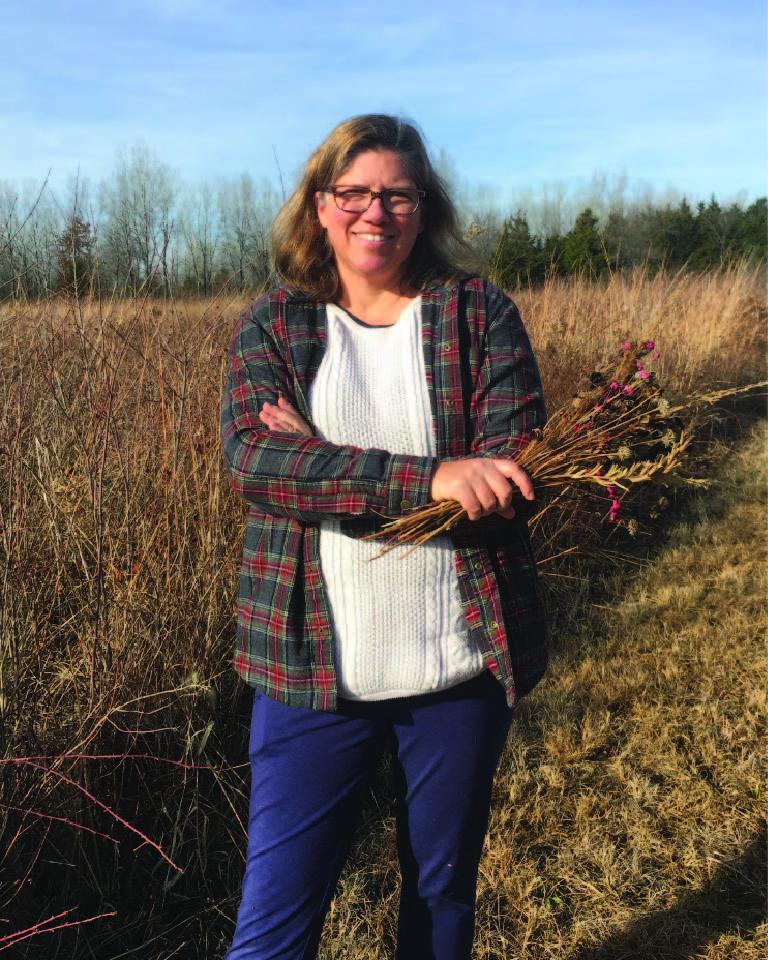Lena Hileman

October 2022 Mentor Spotlight
2022 K. Barbara Schowen Undergraduate Research Mentor Award
Department: Ecology and Evolutionary Biology
Describe your work in a few sentences that we can all understand: My research is aimed at understanding how flowers evolve into a diversity of sizes, shapes and colors. A major study system in my lab is the North American flowering plant genus Penstemon (common name: beardtongue). In this system, species with complex hummingbird-adapted flowers have evolved many times from species with equally complex bee-adapted flowers. This allows us to determine what makes hummingbird-adapted flowers different from bee-adapted flowers. We use a diversity of research tools (for example, genetic, g
Questions:
Q: What does your research look like on a day-to-day basis? What do you spend most of your time doing?
A: On a day-to-day basis my own research is almost exclusively conducted through my mentoring relationships with the graduate and undergraduate students in my lab. They are the scientists carrying out the exciting work, and I now live my research life vicariously through them! We meet regularly to discuss project ideas, analyze data, and troubleshoot experiments. I am sometimes the person who works side-by-side with students learning a new technique, and I cherish these opportunities to still “get my hands dirty.”
Q: How did you first get interested in doing research or creative work?
A: I was very lucky to have a microbiology professor ask me if I was interested in working on a plant evolution project for another professor who was looking for an undergraduate assistant with some background in genetics. The idea that professors didn’t just teach classes, but also conducted research was a huge mystery to me. I doubt I would have had the foresight or courage to ask a professor to join their lab if the opportunity hadn’t been so directly presented to me. Thank goodness I jumped on the opportunity. I was immediately hooked, and this was the first step on my path to becoming a plant evolutionary biologist.
Q: What do students in your discipline learn by doing research that they wouldn’t learn by just taking classes?
A: Students who conduct research gain confidence in their classroom knowledge by connecting what they learn in lecture to what they pursue in the lab. I think this is one of the most important, and sometimes overlooked benefits of an undergraduate research experience. Beyond this, research experiences help prepare students for independence in inquiry-based careers (often research careers). Students learn how to form testable hypotheses, how to use the tools of science to begin addressing their hypotheses, how to analyze data and interpret results, and how to communicate ideas with others.
Q: What do you find to be the most exciting part of doing research or creative work? What makes this line of work meaningful and interesting to you?
A: There are two primary ways in which research is really exciting to me. The first is simple discovery—learning something completely new and telling somebody about it. Most of the time, these are the smallest little gems of knowledge, but every once in a while, a discovery feels really novel (and that definitely gives me a rush of excitement.) The second is my research community. I love working with students and collaborators, sharing ideas, learning from and teaching others. Especially at my career stage, where I am mostly doing science through mentoring, I gain huge job satisfaction from working in a positive, collaborative and supportive environment.
Q: For many students, doing research or a larger creative project is the first time they have done work that routinely involves setbacks and the need to troubleshoot problems. Can you tell us about a time that your research didn’t go as expected? Or about any tricks or habits that you’ve developed to help you stay resilient in the face of obstacles?
Absolutely! As a PhD student, I struggled for a number years trying to get a tricky set of experiments to work. I thought that because it was MY PhD dissertation, I had to figure out how to get these experiments to work on my own. I poured over the literature and modified my protocols again and again. Nothing worked. It didn’t occur to me that it was okay to get help. Finally, I did get training from an expert, but after floundering for a very long time. My experiments worked beautifully after I received some expert help. My advice to everybody (undergraduates, graduate students, professors….) seek out the expertise you need to answer the questions you are passionate about! We are all continually learning to be better scientists with mentorship from those who know a bit more than we do.
Q: How do you spend your time outside of work?
A: I mostly spend my time outside of work with my teenaged kids, husband and dog. Neither my husband nor I are from the Midwest, so we really enjoy exploring the unique outdoor experiences Kansas and surrounding states have to offer. Usually this involves hiking, kayaking and canoeing. During the COVID pandemic, I have most enjoyed visiting the Sandhill crane migration in Southern Nebraska (perfect Spring Break adventure), Little Jerusalem Badlands State Park, and the Tallgrass Prairie National Preserve in Kansas. Actually, we go to the Tallgrass Prairie a few times a year, it’s spectacular!
Twitter: @LenaHileman